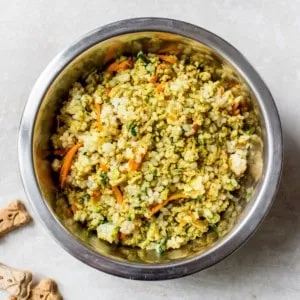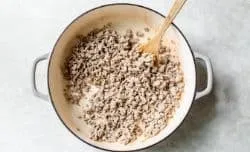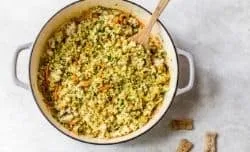Bringing a new dog into your home is an exciting time, and ensuring their health and happiness starts with their diet. While commercial dog food is convenient, many pet owners are exploring the benefits of homemade dog food made with real, whole ingredients. This recipe offers a simple, balanced, and nutritious meal that you can prepare on your stovetop in just 30 minutes. It’s a fantastic way to provide your canine companion with the same quality of nutrition that the rest of your family enjoys.
Making your dog’s food from scratch doesn’t have to be complicated. The key lies in keeping the process simple and balanced. Dogs, like humans, require essential nutrients, including protein, healthy fats, complex carbohydrates, vitamins, and minerals, all in appropriate portions. Adhering to guidelines from organizations like the American Kennel Club (AKC) and the Association of American Feed Control Officials (AAFCO) can help ensure your dog receives the building blocks for a healthy diet. This recipe, featuring ground turkey, vegetables, and brown rice, is a wholesome, protein-packed combination that is both easy to prepare and sure to be a hit with your dog.
For those new to DIY dog treats or homemade meals, consider starting with simple additions like cooked vegetables or shredded chicken mixed into their regular food. Even a few homemade dog treats can be a great way to introduce new flavors and textures.
Key Ingredients and Their Benefits
Creating a balanced homemade dog food involves selecting ingredients that are not only safe but also provide essential nutrients. This recipe is designed to be simple, balanced, and made with easily recognizable ingredients.
* Important Note: Every dog is unique, and consulting with your veterinarian before making significant dietary changes is always recommended.
- Ground Turkey: This lean protein source is crucial for maintaining your dog’s strength and energy levels. While other meats like ground beef, bison, salmon, and chicken are also suitable, ground turkey is often a well-tolerated option.
- Vegetables (Zucchini, Spinach, Carrots): Vegetables provide essential fiber, antioxidants, and contribute to a vibrant meal. It’s important to choose dog-safe options. For a comprehensive list of safe and unsafe fruits and vegetables for dogs, consult resources from the AKC.
- Egg: An easily digestible source of protein, eggs offer vitamins like D and B12 and are gentle on a dog’s stomach. They are a convenient way to boost the nutritional content of any meal.
- Rice (Brown or White): Rice helps bind the ingredients together, making the meal more filling and balanced. Brown rice offers more fiber and nutrients, beneficial for active dogs, while white rice is easier to digest.
- Coconut Oil: This healthy fat supports skin and coat health, as well as digestion. Its mild, slightly sweet, nutty flavor is often appealing to dogs.
- Turmeric (Optional): A pinch of turmeric can offer natural anti-inflammatory benefits due to its curcumin content, potentially supporting joint health and the immune system, especially in older or more active dogs. Use sparingly and mix thoroughly.
*Disclaimer: This recipe is intended to complement your dog’s existing diet, not replace it entirely. As a dog owner sharing a successful recipe, I emphasize the importance of consulting with your veterinarian to ensure your dog’s specific nutritional and caloric needs are met, especially concerning their age, size, and activity level.
How to Prepare Homemade Dog Food
Before you begin cooking, the most critical step is to consult with your veterinarian. They can provide personalized guidance on your dog’s specific nutritional requirements, ensuring the recipe is safe, balanced, and appropriate for your pet.
Heat a tablespoon of coconut oil in a large skillet or pot over medium-high heat. Add one pound of ground turkey and sauté until it is fully browned and cooked through, typically about 10 minutes.
Once the turkey is cooked, reduce the heat to medium. Add one cup of shredded zucchini, one cup of finely chopped baby spinach, and one cup of shredded carrots. Stir in half a teaspoon of turmeric. Cook the vegetables, stirring occasionally, for about 5-7 minutes, or until they become tender.
Turn off the heat. Crack one egg directly into the hot mixture and stir vigorously to ensure the egg cooks evenly within the food. Finally, stir in three cups of cooked rice (brown rice is a good choice for its fiber content). Allow the mixture to cool completely before serving it to your dog.
Recommended Serving Size
Determining the correct serving size for homemade dog food is essential and depends on various factors, including your dog’s weight, age, and activity level. Always seek personalized advice from your veterinarian for the most accurate guidance.
A general approach to gauging serving sizes at home involves monitoring your dog’s overall condition. Ensure they are maintaining a healthy weight, remain energetic throughout the day, and show enthusiasm for their meals. This recipe yields approximately six cups of food, which is usually sufficient for a 45-pound dog for about three days. You can easily adjust the quantities based on your dog’s individual needs or prepare larger batches to reduce cooking frequency.
If you’re interested in more dog-friendly recipes or treats, please share your thoughts in the comments below!
Watch & Learn: Let’s Make It Together!
If you try this recipe, we’d love to hear about it! Please leave a comment and a star rating below. Thank you for your support!
 Homemade dog food in a metal dish
Homemade dog food in a metal dish
Print Recipe Pin Recipe 4.68 from 259 votes
30-Minute Stovetop Homemade Dog Food
Learn how to make nutritious dog food at home. Your furbaby will love their meals, and you’ll love that this recipe for homemade dog food is easy and made with whole-food ingredients you recognize!
Course: DINNER
Cuisine: American
Author: Dani Spies
Prep Time: 10 minutes
Cook Time: 20 minutes
Total Time: 30 minutes
Servings: 6 cups
Calories: 240kcal
Save this recipe?
Enter your name and email, and I’ll send it to your inbox. Plus, you’ll get delicious new recipes every week.
Ingredients
- 1 tablespoon coconut oil
- 1 pound ground turkey
- 1 large zucchini, shredded
- 1 cup baby spinach, finely chopped
- 1 cup shredded carrots
- 1/2 teaspoon turmeric
- 1 egg
- 3 cups cooked rice (using frozen brown rice is convenient)
Instructions
- Heat a large skillet or pot over medium-high heat. Add the coconut oil and ground turkey. Sauté until the turkey is browned and cooked through, approximately 10 minutes.
 Browning ground turkey in a pot
Browning ground turkey in a pot - Reduce the heat to medium. Stir in the shredded zucchini, chopped spinach, shredded carrots, and turmeric. Cook, stirring occasionally, for 5-7 minutes, until the vegetables are tender.
 Adding vegetables to ground turkey mixture
Adding vegetables to ground turkey mixture - Turn off the heat. Crack the egg into the mixture and stir well to combine and cook the egg thoroughly.
- Stir in the cooked rice until all ingredients are evenly distributed. Allow the food to cool before serving.
 Stirring rice into the vegetable and ground turkey mixture
Stirring rice into the vegetable and ground turkey mixture
Notes
Storage Tips:
- Refrigerator: Store cooled homemade dog food in an airtight container in the refrigerator for up to 5 days.
- Freezer: For longer storage, freeze the dog food in freezer-safe containers for up to 6 months. Thaw overnight in the refrigerator before serving.
Nutrition (per 1 cup serving)
- Calories: 240kcal
- Carbohydrates: 26g
- Protein: 22g
- Fat: 5g
- Saturated Fat: 3g
- Polyunsaturated Fat: 1g
- Monounsaturated Fat: 1g
- Trans Fat: 0.02g
- Cholesterol: 69mg
- Sodium: 71mg
- Potassium: 496mg
- Fiber: 3g
- Sugar: 2g
- Vitamin A: 4157IU
- Vitamin C: 9mg
- Calcium: 34mg
- Iron: 2mg

 Browning ground turkey in a pot
Browning ground turkey in a pot Adding vegetables to ground turkey mixture
Adding vegetables to ground turkey mixture Stirring rice into the vegetable and ground turkey mixture
Stirring rice into the vegetable and ground turkey mixture